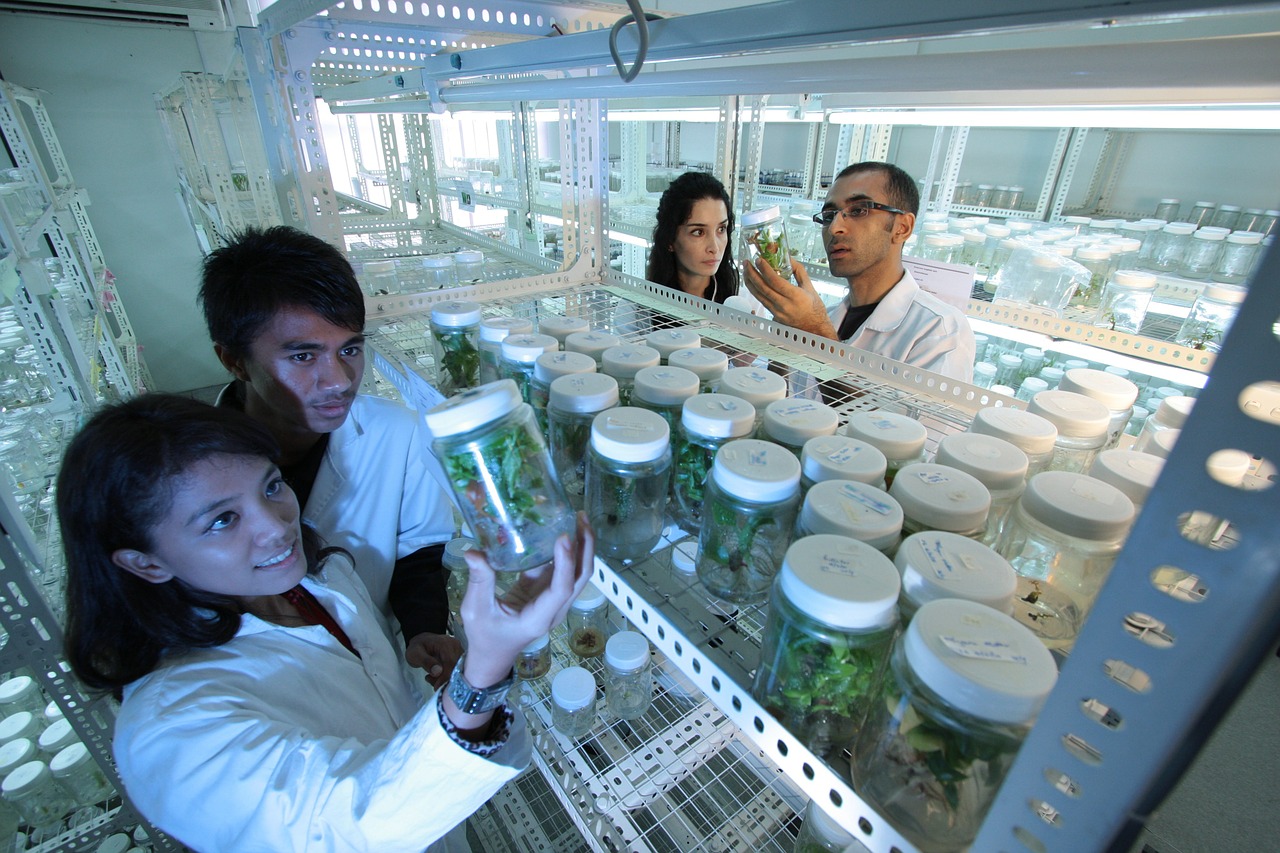Recently I had the opportunity to return to my old university – The University of Sheffield – and take part in a networking event for early career researchers in plant physiology. The event was fully booked and attended by people soon to finish their undergraduate degrees, through to those with a good few years of post-doctoral research experience under their belts. Many were carrying out research that would feed directly into improving agriculture, particularly plant breeding. Others were working on more diverse topics such as Arctic browning but accumulating numerous field skills that would be applicable to the agricultural sector.
I was invited to the event to sit on a careers panel having completed a PhD in plant sciences but since left academia to work as a plant science specialist in CABI’s editorial team. Others on the panel included those who have remained on the academic track and another employed as an agricultural consultant. Discussions were fruitful, yet I was still surprised at the large number electing to leave academia and particularly those choosing to leave behind the agricultural sector all together.
Why are young people turning their backs on agricultural careers and what can be done to reverse it?
This exodus from the agricultural sector is not limited to the UK; it is recognised on a global scale. For example, it is a particular problem in the rural developing world, where insufficient access to skills development and education; limited access to resources such as land; and low levels of involvement in decision-making processes have dis-engaged youth from agriculture. There are now measures in place to try and reverse this trend and help rural youth see a future for themselves in agriculture. Some nice case studies on intervention programmes can be read here.
Returning back to the developed world, an online survey, commissioned in 2015 by the National Centre for Universities (NCU) and Business, was conducted to understand the attitudes and perceptions of careers in the agriculture and the food sector of 500 UK undergraduates studying a range of subjects, and 154 graduates newly employed in the agriculture and food sector.
The survey found that the undergraduates had a poor awareness of career possibilities in the agricultural and food sector – a view echoed by some of those already working in the arena. Furthermore, neither group perceived careers in either food or agriculture as an attractive option. When questioned why they had not considered a career in the sector, the undergraduates cited reasons of low pay, low appeal and lack of a clear career path. However, there were some grounds for optimism; people do see the food economy as important to the UK. Those already employed gave reasons to recommend the sector, including the number and variety of employment opportunities, and the strong demand and growth potential of the sector. Also, the economic importance and the social purpose of the work are rewarding, bringing high job satisfaction.
Recommendations to encourage more young people to enter the sector were explored in the report. A Key priority was to provide more information about the wide range of careers and opportunities that it contains, and the scope for progression in the sector – this could be achieved via better advertising and marketing of potential opportunities and careers. Placements and spells of work experience allowing students to see the food economy from the inside are another good tool to spark interest in the sector. Problems of low pay were also seen as a barrier; offering higher salaries and other financial benefits could enable agriculture and food to compete with other sectors for graduate talent more effectively.
We need to make young people aware of the utility of plants at an early age
Exposing young people at an early age to the range of careers in agriculture and related fields, I feel is a crucial strategy. The NCU report suggests ‘a key priority is reaching undergraduates on degree programmes that are not specifically linked to agriculture and food’. Whilst this is a good and valid point of target, on some levels I feel that this is too late. Many students will have already decided their career paths at this stage – a report from the Aspires project at King’s college, London, showed that children have fixed aspirations of what they want to do by the age of 14, so maybe we should be talking to them earlier?
In 2014 the UK Plant Science federation (UKPSF) – a special interest group of the Royal Society of Biology published a report – UK Plant Science: Current status and future challenges –which revealed that there is a significant shortage of investment in UK plant science. Scrutinising the current school’s biology curricula showed plant sciences to be poorly represented compared with biomedical sciences, thereby providing little incentive for teachers to invest time and energy in plant science education. Furthermore, few teachers have a background in plant sciences and there is a distinct lack of good teaching materials available for them to confidently deliver high quality plant science teaching. Plants also suffer from what has been coined ’plant blindness’ or ‘zoochauvinism’ in efforts to describe how plants are perceived as uninteresting whilst animals are not. Consequently, few students beginning biology degrees show significant knowledge or interest in the subject of plants or what careers studying them can bring. This lack of investment at early stages has much wider reaching impacts; the low level of student interest in plant science compared with other biosciences has contributed to a decline in the number of UK higher education institutions offering specialist plant science degree. For example, the last pure botany degree disappeared from the UK in 2013; and plant science as a single degree subject, is only available at a handful of UK institutes. Agriculture fares a little better, currently there are 17 universities/colleges that offer degree courses in agriculture – although this doesn’t seem that many when you consider that Britain is home to more than 150 universities, higher education colleges and specialist conservatoires.
The UK is suffering from a skills shortage in plants science and related fields
This lack of fundamental investment in plant science is creating a significant skills gap in the UK. Public consultations spearheaded by the Biotechnology and Biological Sciences Research Council (BBSRC), highlighted plant and agricultural Sciences as strategically important, but vulnerable. Skills shortages were found to exist in: Taxonomy and identification, crop science, horticultural Science, plant pathology, plant physiology and field studies. Concerns were also raised about ecology, plant entomology and nematology, genetics and weed science. Furthermore, many of these areas were found to be suffering from an aging population; many specialists are nearing retirement yet there are few available to replace them. For example, in plant pathology 62% of the workforce surveyed were aged 50 or over, whilst only 4% were under 30.
Inspiring young minds about plants
So how can we encourage young people into plant and agricultural sciences to try and close this gap? There are a number of initiatives run by national learned and public societies now in existence to try and inspire young people about plants and related careers. The most well-known initiative in the UK is the Gatsby Plant Science Summer School. Started in 2005, it is an annual week long residential event aimed at first-year undergraduates that includes hands-on exercises and talks from international research leaders. Students discover how plant science could contribute to problems in food security, energy, and climate change and are encouraged to continue their interest by taking second-year plant science courses at their universities. Also supported by Gatsby, Science and Plants for Schools (SAPS), work with curriculum developers to produce useful teaching resources on the importance of plants for both primary and secondary levels. Focused more to the careers side Bright Crop aims to showcase the exciting career opportunities there are in farming and food. The resource incorporates case studies from people working in diverse roles in the sector from machinery engineers to scientific researchers. On a global scale there is the the International Fascination of Plants Day (FoPD), an initiative of the European Plant Science Organisation (EPSO) and the Global Plant Council (GPC), where plant scientists engage with schools and the public to enthuse them about the wonders of plants and their importance to society. Events are run everywhere, on farms, at universities, in botanical gardens even at companies; some of the successes from the last event in 2015 can be viewed here.
You’ll be pleased to hear CABI are doing their bit. Staff recently ran a five-day course on Integrated Pest Management (IPM) at the Graduate School of the Chinese Academy of Agricultural Science (CAAS) in Beijing. MSc and PhD students from China, Bangladesh, Cambodia, Ethiopia, Myanmar, Germany, Iran, and Pakistan received training in several areas of IPM from diagnosis through to management. CABI also partner with the British Society for Plant Pathology (BSPP), Defra and the the Royal Horticultural Society (RHS) to deliver a one-day training course on practical skills for diagnosis of plant pathogens in the field and laboratory – this is largely aimed at postgraduate students and plays an important role in helping bridge the UK skills gap in Plant Pathology . More recently (2015) CABI, in collaboration with the University of Neuchâtel, Switzerland and the Jura Canton established a Masters of Advanced Studies in Integrated Crop Management (also offered as a Diploma of Advanced Studies). The course is more aimed at professionals and specialists from crop or environmental management and offers training in crop management principals and new techniques that could be incorporated into the agricultural systems of their home countries.
References and further reading
Hughes T, Spong S, Sheen J, 2015. Attitudes and Perceptions of Careers in Agriculture and the food Sector. Food Economy Task Force, Work stream 1. CFE Research, Leicester, UK. Commissioned by National Centre for Universities and Business (NCUB), 40 pp.
ASPIRES, 2013. ASPIRES report: Young people’s science and career aspirations aged 10-14. Department of Education and Professional Studies: Kings College London, 40 pp.
UK Plant Science: Current status and future challenges. A report by the UK Plant Sciences Federation (January 2014), 36 pp.
BBSRC Bioscience Skills and Careers Strategy Panel, 2009. Strategically Important and Vulnerable Capabilities in UK bioscience, 27 pp.
Drea S, 2011. The End of the Botany Degree in the UK, Bioscience Education, 17: 1-7, DOI: 10.3108/beej.17.2
1 Comment
Leave a Reply
Related News & Blogs
3 ways that preprints help researchers in agricultural and plant sciences
The use of preprints (pre-peer reviewed versions of scholarly papers) has accelerated in the last few years with many researchers now sharing their latest work with the scientific community before or in parallel to publication with a journal. After a s…
12 April 2021





Something I have been asking for many years -see https://simonleather.wordpress.com/2014/09/02/how-do-we-save-uk-plant-sciences/